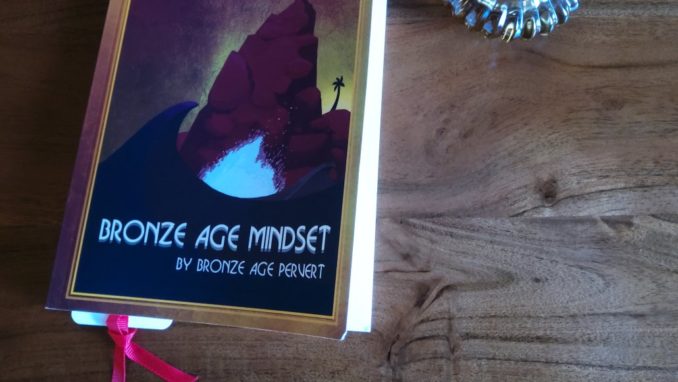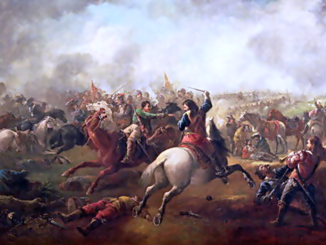
“I have to make this restatement now at the end of this brief manifesto: Many are domestic animals and happy that way. I speak instead to the men who feel stifled by this bug world.”
I love the book Bronze Age Mindset by Bronze Age Pervert. (We will refer to the acronyms BAM and BAP respectively from here on in.)
Many have called BAM a masterpiece. The first great philosophical work of the 21st Century. Others have said that it is the start of a new aesthetic vanguard, which will eventually overthrow the Western Regime. Ingrid on Goodreads simply said, “wtf am I reading?”
In this article, I will try to sum up some of the key themes of BAM. I’ll also quote at length some choice passages to give you a taster of the work. I would guess that even on the right most people will not be able to get to grips with a book like BAM, for lots of reasons. But, if you are into truly radical thought, have an impish sense of humour, or simply enjoy highly expressive writing, you may well find it hits the mark.
Anonymously self-published in 2018, BAM reads like a collection of 77 internet message board postings. Thes self-described “exhortations” cover a broad range of topics, from seemingly bizarre conspiracy theories to serious philosophy. As a result, you’re never quite sure if this book is mere trolling – a sophisticated meme appealing to clever alt-right young men – or is it something more profound? A meta narrative for the insanity of our times maybe? Obviously, I’m bothering to write a review for Puffins, so I think there is much profundity in BAM.
The following paragraph from the book’s preface neatly captures the book’s essence and core themes. (Highlights are my own emphasis).
“In the Bronze Age men had life and force, and I already see, far on the horizon of our world, but the glimmer is surely there—may it not be a mirage!— I see this spirit returning surely in our time. Piratical bands and brotherhoods will take to the seas, and not just to the seas. The enemies of Western man and the enemies of beauty are to learn just what was meant by a piratical race, a nest of pirates like the Chinese thought of the Dutch on first meeting them. I want to prepare you to receive this old spirit—old spirits are moving, from behind the reeds… the silhouette shimmers against a river in late summer, and I see already men who know how to honor such uncanny old friends.”
Who is the author, BAP? Although he is active on the internet and even produces podcasts, he has somehow maintained anonymity. On the face of it, BAP is a heavily accented Eastern European man who appears to live a transient life hanging out in gyms and seedy nightclubs with hookers and pimps. He is a big fan of Nietzsche and knows a lot about Ancient Greece. Some have speculated that BAP is not one person, but a project of the American dissident right. BAP’s outrageous narratorial voice is an enjoyable stylistic trick which creates the book’s unique tone. It is obvious though that whoever BAP is in real life, he knows his stuff and has well thought-out ideas about the problems of the world. He calls our current time the reign of “yeastlife” and of the “bugman”. (And note, BAP concerns himself with all of the world’s civilisations (not just the West), as well as of all of human history). The somewhat comedic persona of the narrator could well be designed to allow BAM to make some very controversial statements under the radar of the mainstream. A typical statement by BAP is to make an outrageous generalisation about a race or group, but then say he doesn’t mean to pick on them as nearly everyone is like that too. A respected author writing the same things would be cancelled or worse. (BAP himself calls for any of his followers who may choose a mainstream political career to disavow him.)
The BAP character is also exactly the sort of edgy Eastern European dude who would appeal to a 20 year-old American alt-right fanboy. On a podcast he once warned the left in his thick accent that if they try to dox him to remember that he has some handy friends who would be happy to retaliate on his behalf! At the very least though, the grammatical errors and often pidgin English prose seem a deliberate trick to ward off normie readers.
BAM is not an academic work. It doesn’t have footnotes or rely on argumentation in a conventional sense. But it does cover philosophy, history and politics in abundance, as well as including a dose of self-help – BAP gives advice on health and relationships, for example. But BAM is primarily written as an “exhortation” by the narrator “of his reveries”. As such, the work serves more like an object of avant garde art whose purpose is to inspire rather than convince intellectually. It does this precisely by being this concept book operating on different levels as I have already mentioned. Its metaphors, stories and descriptive passages are also surprisingly poetic, evocative and moving in places. There is an appeal to heroism throughout. It is also full of humour. I couldn’t help feeling endeared to both the narrator and the mysterious author winking at me from behind the persona.
The two main themes of BAM are that beauty is the true driver of the human spirit, and of man’s need to master the space he inhabits. BAP sees these impulses as culminating in certain places, cultures, races and individual men throughout history, but often fleetingly. In contrast, BAP sees much of history, and certainly the current world, as aesthetically ugly and as a prison both mentally and physically. BAM is ultimately a deeply anti-egalitarian manifesto.
Why do I like the book so much? It appeals to me aesthetically and spiritually rather than by pure reason like most books covering the same ground. It appeals (however unrealistically) to my own lust for conquest, heroism and mastery of space. Even if I might disagree with an idea within the book – at a political, or even factual level – I can’t help but agree emotionally with that sense of spirit and possibility within me that the idea evokes. In a time when the right stupidly fights on the left’s chosen battleground head on, a book like BAM is an audacious outflanking manoeuvre. BAP’s appearance of eccentricity, and even madness at times, is actually his camouflage.
The book has four parts. The individual sections within each part often meander back and forth however, retracing previous themes, so it’s the sort of book you can randomly dip into.
In part 1, BAP discusses our common understanding of what life is – “what if you’ve been misled about what is life?”. The purpose of this section is to encourage the reader to open his mind to radical ideas and question preconceived wisdoms. For example, BAP discusses how the theory of evolution is incomplete, and of the limitations of objectivity and of science. He frequently uses the animal kingdom to analyse the human condition. He discusses God, the Gods, and reincarnation. He has a complete disdain for academia. In later parts of the book he considers revisionist histories, although some of his suggestions are so crazy that I assume he is having a laugh at points. The net effect though is that you are left feeling that modern knowledge lacks the depth and insight of ancient wisdom, and modern thinkers lack the heroism and strength of will of the ancients.
In this next excerpt BAP brilliantly attacks what he calls the nerd mentality that dominates our culture:
“The nerd can be described as a person of inelegant and pedantic intelligence, often middling intelligence, who takes excessive pride in the intellect, even in the memorization of facts, the design of clumsy concepts to which reality is then expected to fit like to bed of Procrustes…He never sees things like the true genius or the artist does, when the perceiving part of the intellect becomes so powerful that it really overpowers everything else…so that the fullness of the object occupies all of consciousness and an idea, or some new insight into the world, is actually grasped. No, the nerd is a creature of will, under the direction of a petty will in the everyday sense, and all of his thoughts, concepts, and designs have a forced quality because they refer always to need and desire for some kind of gain… Nietzsche said manliness is the first requirement of the philosopher, but there’s no one farther from the philosopher than the unmanly nerd, and there’s no enemy more implacable of the human race and of the genius of the species, than just this nerd and everything he represents.”
In Part 2, BAP discusses further the current malaise of humanity. He tells us straight away that his view here is essentially the same as Nietzsche’s conception of the Last Man in Thus Spoke Zarathustra. (Nietzsche is mentioned 27 times within the book). BAP’s interesting take here is that he doesn’t blame modernity and technology per say, but sees the problem as a recurring state, with many other periods of history being similarly bad.
“I understand the desires of those on the right who long for the great parts of the past, but understand this: any such attempt in the modern world, I mean to promote the small village, the rustic life, the modest life, will lead not to the reestablishment of the glories of past ages, but to the freezing of modern corruption, to its stabilization and permanence.”
In Part 3, BAP takes us through a whirlwind tour of history to give us examples of the men of action he admires. The Ancient Greeks are his archetype for this ideal, but he also talks highly of the men from the age of exploration and more recent figures such as the mercenary Bob Denard. Any fans of classical history and adventure will likely enjoy this section of the book just from the sheer bravado on display. As BAP says:
“But I think it’s good for all of us to remember we’re panty-wearers compared to them. Also, while you may not be able to emulate them in every way, because the age we live in is one of total repression, you can still take some inspiration from their examples, and try to live the same in some way…try to live according to a Bronze Age Mindset.”
In Part 4, we are brought back more to our current time as BAP discusses what is to be done. Given the high-mindedness of what has come before, BAP offers surprisingly sensible and practical guidance here as he recognises how stacked the odds are. He discusses individual self-help style advice but then juxtaposes this with considering the big picture at a civilisational level. It’s all a bit like Jordan Peterson but on a crazier scale. He recognises that many of his readers will inevitably be mere autists dominated by society’s constraints, but perhaps some may become the great men he sees for the future. Although BAP is clearly more in favour of pagan religions, he recognises the need to ally with Christians.
“Offending Christians in political movements is stupid, when they’re one of the last bastions against a common enemy.”
BAP ultimately predicts military government as an inevitability, as he sees it as the natural form of human governance. In the near term he advocates for a leader a bit like Trump emerging, although writing in 2018 he seems to have predicted that Trump would not be that leader himself.
“A man of great charisma who can seduce the people with a wild spirit and break through the rule of the pervasive bureaucracy-media complex is our best hope for the immediate problem…and maybe our only hope. Such a man might be among you and, in any case, he will need help. Our enemy has so much spread: he is everywhere. He’s in your home even, and he’s inside you. The domain of the fight has extended everywhere now.”
In conclusion, the best way to read BAM is to let it wash over you at first. Every sentence is packed with ideas. I have merely scratched the surface in this article of some of the ideas put forward. For example, the book discusses the role of women in society, homosexuality, transgenderism, democracy, dictatorships, environmentalism and many other topics. If you aren’t put off by the style, or the outrageous generalisations, you might find yourself re-reading it time and again.
You can buy the book on Amazon. The audiobook rendition is also recommended. Or you can easily find the pdf to download on the internet for free.
“Victory to the Gods!”
© text & image JimmySP 2022



